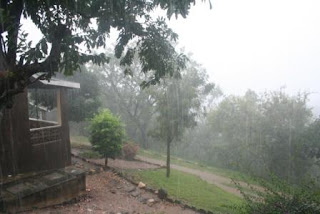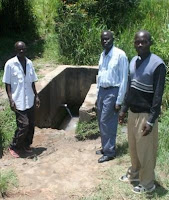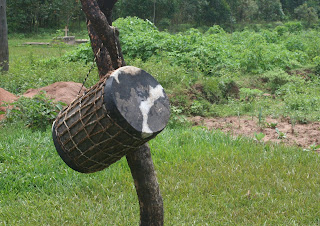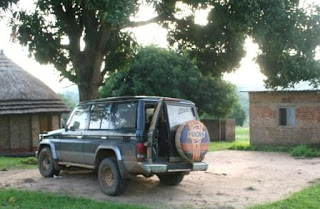 A visit to the Murchison Falls just a week ago saw them at their most dramatic. Now, at the end of the rainy season, the Victoria Nile, wide and languid for much of its course, was full as the white water cascaded towards the narrow cleft in the rocks before plunging 140 feet to the river below and on to Lake Albert. In the brilliant sunshine it was truly awesome with clouds of spray and rainbows in profusion.
A visit to the Murchison Falls just a week ago saw them at their most dramatic. Now, at the end of the rainy season, the Victoria Nile, wide and languid for much of its course, was full as the white water cascaded towards the narrow cleft in the rocks before plunging 140 feet to the river below and on to Lake Albert. In the brilliant sunshine it was truly awesome with clouds of spray and rainbows in profusion.That experience was in marked contrast to aggressive and objectionable baboons, one of which decided to leap through the open window of our Land Cruiser whilst we were waiting for the ferry at Paraa. No one was in the car at the time but the intruder was chased out empty handed, and without causing any damage.
Some 10 minutes later, however, we managed to suffer a 3 inch gash in our tyre as a result of a torn piece of metal on the ramp on to the ferry. But even that had its upside as three South African employees of British American Tobacco who were making the same crossing executed an impressive Formula One style wheel change, completing the whole operation in the time it took to cross the river – around 7 minutes! The Parable of the Good Samaritan came to mind!
 We had gone to Murchison Park with Emma and Pete, and Laura, British expatriate doctors and a midwife, also living and working at Kuluva Hospital. It was a brief weekend’s break from work, and en route to Murchison Park we decided to visit the Nebbi Prayer Mountain some 20 km beyond the town of the same name. We had heard a great deal about the Prayer Mountain as a place to pray, praise, and find peace and space to gain a renewed and God-centred perspective on life.
We had gone to Murchison Park with Emma and Pete, and Laura, British expatriate doctors and a midwife, also living and working at Kuluva Hospital. It was a brief weekend’s break from work, and en route to Murchison Park we decided to visit the Nebbi Prayer Mountain some 20 km beyond the town of the same name. We had heard a great deal about the Prayer Mountain as a place to pray, praise, and find peace and space to gain a renewed and God-centred perspective on life.The Prayer Mountain is a Retreat Centre built on the Korean pattern and belonging to Nebbi Diocese, Madi/West Nile’s southern neighbour. The foundation stone on the main chapel was laid in 1996 and the whole site was funded and built by a retired Korean Business Executive at a time when the present Archbishop of Uganda, Henry Orombi, was Bishop of Nebbi.

Prayer Mountain is set in a stunningly beautiful countryside, close to the Congo border, and is made up of nine Prayer Points marked by small stone ‘chapels’ located at various places on the mountainside. Each Prayer Point has its own unique and powerfully symbolic design, giving a particular focus which individuals can use to direct their prayer.
 The focuses for prayer reflect a global concern, but naturally with a particular emphasis on the needs of Africa. There is also an emphasis on young people, families, and the worldwide need for revival and spiritual renewal. Different arrangements and numbers of windows feature strongly in the design of the small Prayer Points buildings symbolising, amongst other things, the 10 Commandments, the 9 Fruits of the Spirit, the 66 Books of the Bible, the 12 disciples, and so on.
The focuses for prayer reflect a global concern, but naturally with a particular emphasis on the needs of Africa. There is also an emphasis on young people, families, and the worldwide need for revival and spiritual renewal. Different arrangements and numbers of windows feature strongly in the design of the small Prayer Points buildings symbolising, amongst other things, the 10 Commandments, the 9 Fruits of the Spirit, the 66 Books of the Bible, the 12 disciples, and so on.  Through the windows you can see out to the hills beyond in every direction which gives everything a sense of space, freedom. But the often very strenuous walks between the various Prayer Points prevent any possibility of prayer becoming simply a form of self-indulgence and escapism. Prayer involves work.
Through the windows you can see out to the hills beyond in every direction which gives everything a sense of space, freedom. But the often very strenuous walks between the various Prayer Points prevent any possibility of prayer becoming simply a form of self-indulgence and escapism. Prayer involves work.On this occasion, ours was simply a fleeting visit; an opportunity to visit somewhere of which we had heard but had never visited. Places to stop and reflect, places to retreat to in order to regroup and move forward again, are few and far between in NW Uganda. Life is full of people and busy-ness, although often not very productive. But even in our brief time at Prayer Mountain we were able to gain some new insights into our work here. Perhaps especially that, whilst living in Uganda, God has not simply called us to work for him with and alongside others. He also wants to work with us and to continue his work of transformation in us.
Murchison Falls has always had the capacity to impress with its power and grandeur, and Prayer Mountain is also about power - the power to transform and change individuals, and so the world. It is just 90 minutes from Kuluva, and God-willing we will return to Prayer Mountain to be empowered for the work God has sent us here to do, and to be transformed a little more ourselves.

























 It was a splendid day of celebration with Jo together with her friends and their families, enhanced by a short, pithy and very amusing speech by Bill Bryson in response to the honorary DLitt he received at the graduation ceremony.
It was a splendid day of celebration with Jo together with her friends and their families, enhanced by a short, pithy and very amusing speech by Bill Bryson in response to the honorary DLitt he received at the graduation ceremony.

